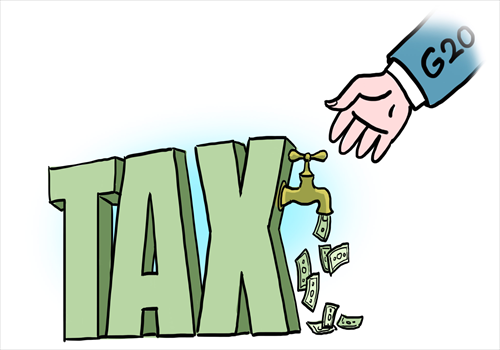Tax evasion crackdown could bridge gap between G20 and public

Illustration: Liu Rui/GT
Every time a G20 summit takes place, its agenda looks ambitious. The Brisbane summit, which will take place on Saturday and Sunday, is no exception. Themes to be discussed include energy, development, infrastructure, growth, tax and trade. Relative consensus by G20 members is of high significance for the global economic stability, taking into account that they represent two thirds of the world's population, 85 percent of global GDP and over 75 percent of global trade.
Nevertheless, the main challenge for G20 leaders is not only to overcome internal differences and issue joint statements, but also to build trust in their relationships with citizens of the world. It is not a coincidence that the G20 summits often lead to demonstrations, reactions and public protests. Activists, for instance, are prepared to express their anger in Brisbane because of rising inequality, the lack of social justice and multinational tax avoidance.
Ironically, the Brisbane summit happens at a time when the new President of the European Commission Jean Claude Juncker is facing charges for allegedly allowing the creation and operation of tax-havens in his country, Luxembourg.
In principle, G20 members have agreed to crack down on tax evasion. For example, Australian Finance Minister Joe Hockey said ahead of the upcoming summit that world leaders are united on the matter. But expectations to completely curb unfair competition should not be necessarily raised high, because patent boxes still give the opportunity to some companies, including digital ones, to escape and ignore the rules.
The size of the global underground economy cannot be easily estimated. That is because the concept of tax evasion includes various non-payment tricks such as social security contributions, normal taxes and value-added taxes as well as undeclared work and goods.
As far as the latter is concerned, a recent Eurobarometer poll suggests that 11 percent of European citizens have acquired undeclared goods or services in the previous year while 4 percent confessed they have undertaken undeclared paid work. Real percentages are probably even higher as respondents do not often want to associate their names with almost illegal actions.
Furthermore, tax evasion is an opaque issue because money laundering as well as bribery in the official sector are not always successfully monitored by the police and relevant regulatory mechanisms.
The EU has estimated the global size of the underground economy at around $10 trillion according to a 2011 survey. Additionally, a survey by the Organisation for Economic Co-operation and Development of the following year demonstrated that in Italy, Mexico and Poland the non-observed economy accounted for a high percentage of their GDP, around 15 to 17 percent. Moreover, Greece has been entrapped in a vicious circle of economic problems, and unable to bring many "big name" tax evaders to justice and force them to pay back what they owe.
The problem is a common one and its dimension remains dangerous. G20 leaders, who seek to boost growth and promote infrastructure, will have more chances to find the necessary funds should they efficiently collect taxes and limit tax avoidance attempts made by individuals and companies. The lack of liquidity should be hardly considered a serious reason for delays in providing stimulus in a world where "black money" plays a significant role in markets and day-to-day life.
More importantly, G20 members have the opportunity to show to citizens of the world that they are determined to bring an end to the smoldering feeling of injustice. In many societies hard-working and honest citizens have to pay disproportionate amounts of taxes because shrewd individuals and well-connected companies avoid covering their normal share. G20 leaders should stop this. They will benefit and increase their reputation by being perceived as flag-bearers in the fight against tax evasion.
The author is a research fellow at the Hellenic Foundation for European and Foreign Policy. opinion@globaltimes.com.cn